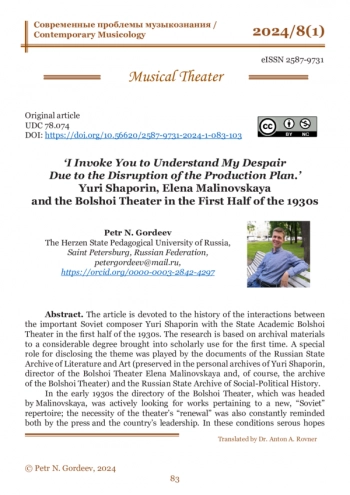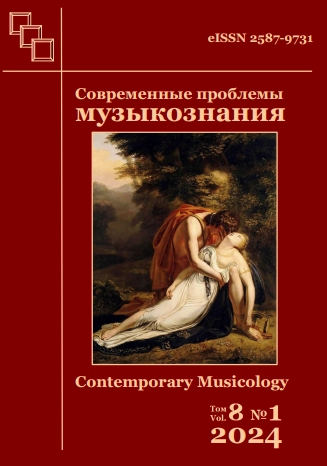Статья посвящена истории взаимоотношений крупного советского композитора Ю. А. Шапорина с Государственным академическим Большим театром в первой половине 1930-х годов. Исследование основано на архивном материале, в значительной степени впервые вводимом в научный оборот. Особую роль в раскрытии темы сыграли документы из Российского государственного архива литературы и искусства (хранящиеся в личных фондах Ю. А. Шапорина, директора Большого театра Е. К. Малиновской и, конечно, фонде Большого театра) и Российского государственного архива социально-политической истории.
В начале 1930-х руководство Большого театра, который возглавила Малиновская, активно искало произведения нового, «советского» репертуара; о необходимости «обновления» театра напоминала и пресса, и политическое руководство страны. В этих условиях серьезные надежды стали возлагаться на сотрудничество с жившим в Ленинграде композитором Юрием Шапориным, который обязался представить симфонию и оперу. Последняя, написанная на сюжет о восстании декабристов, была более важной для театра. Малиновская рассчитывала на то, что это произведение откроет величественный музыкальный цикл, посвященный истории революционного движения в России: две следующие оперы, которые предстояло написать Шапорину, должны были быть посвящены народовольцам и марксистам. Однако работа над «Декабристами» начала недопустимо затягиваться, чему виной были как беспечность композитора, работавшего лишь время от времени над порученным ему произведением, так и его разногласия с писателем А. Н. Толстым, работавшим над либретто по мотивам собственной повести, написанной ранее. В результате вплоть до 1935 года (отставки Малиновской и смены руководства в Большом театре) «Декабристы» так и не были завершены (это произошло много позднее, в 1953 году, в иных исторических условиях).
The article is devoted to the history of the interactions between the important Soviet composer Yuri Shaporin with the State Academic Bolshoi Theater in the first half of the 1930s. The research is based on archival materials to a considerable degree brought into scholarly use for the first time. A special role for disclosing the theme was played by the documents of the Russian State Archive of Literature and Art (preserved in the personal archives of Yuri Shaporin, director of the Bolshoi Theater Elena Malinovskaya and, of course, the archive of the Bolshoi Theater) and the Russian State Archive of Social-Political History. In the early 1930s the directory of the Bolshoi Theater, which was headed by Malinovskaya, was actively looking for works pertaining to a new, “Soviet” repertoire; the necessity of the theater’s “renewal” was also constantly reminded both by the press and the country’s leadership. In these conditions serous hopes were set on the collaboration with Leningrad-based composer Yuri Shaporin, who committed himself to presenting a symphony and an opera. The latter, which was supposed to have written on the plotline of the insurrection of the Decembrists, was more crucial for the theater. Malinovskaya expected this composition to open with itself a grandiose musical cycle devoted to the history of the revolutionary movement in Russia: the two following operas which Shaporin was expected to write were supposed to be devoted to the members of the Narodnaya Volya [People’s Will] revolutionary movement and to the Marxists. However, the work on The Decembrists began to be delayed unacceptably, which was the result both of the irresponsible behavior of the composer, who worked only from time to time on the composition entrusted to him, as well as his disagreements with the writer Alexei Nikolayevich Tolstoy, who was working on the libretto based on his own novelette written by him earlier. As the result, prior to 1935 (the year Malinovskaya resigned and there was a change of the directory of the Bolshoi Theater) The Decembrists were not completed (this happened much later, in 1953, already in different historical conditions).






